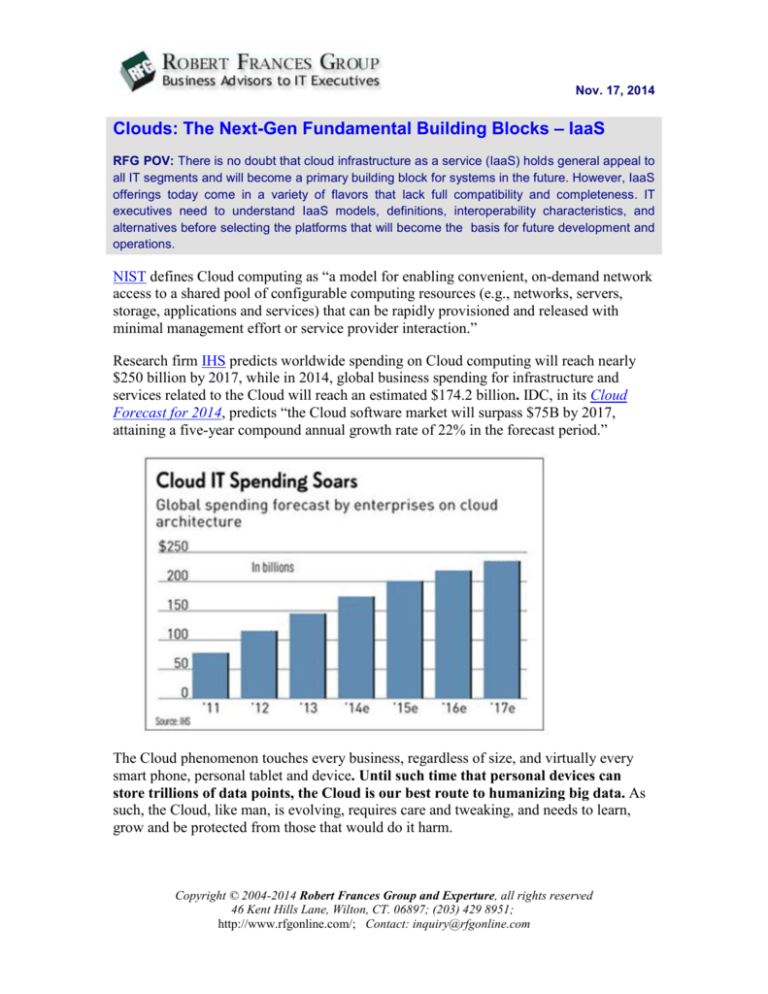
Nov. 17, 2014
Clouds: The Next-Gen Fundamental Building Blocks – IaaS
RFG POV: There is no doubt that cloud infrastructure as a service (IaaS) holds general appeal to
all IT segments and will become a primary building block for systems in the future. However, IaaS
offerings today come in a variety of flavors that lack full compatibility and completeness. IT
executives need to understand IaaS models, definitions, interoperability characteristics, and
alternatives before selecting the platforms that will become the basis for future development and
operations.
NIST defines Cloud computing as “a model for enabling convenient, on-demand network
access to a shared pool of configurable computing resources (e.g., networks, servers,
storage, applications and services) that can be rapidly provisioned and released with
minimal management effort or service provider interaction.”
Research firm IHS predicts worldwide spending on Cloud computing will reach nearly
$250 billion by 2017, while in 2014, global business spending for infrastructure and
services related to the Cloud will reach an estimated $174.2 billion. IDC, in its Cloud
Forecast for 2014, predicts “the Cloud software market will surpass $75B by 2017,
attaining a five-year compound annual growth rate of 22% in the forecast period.”
The Cloud phenomenon touches every business, regardless of size, and virtually every
smart phone, personal tablet and device. Until such time that personal devices can
store trillions of data points, the Cloud is our best route to humanizing big data. As
such, the Cloud, like man, is evolving, requires care and tweaking, and needs to learn,
grow and be protected from those that would do it harm.
Copyright © 2004-2014 Robert Frances Group and Experture, all rights reserved
46 Kent Hills Lane, Wilton, CT. 06897; (203) 429 8951;
http://www.rfgonline.com/; Contact: inquiry@rfgonline.com
Nov. 17, 2014
Bottom Line
The primary Cloud infrastructure components (the Body) are Compute, Storage and
Networks – and, one could argue, Databases, various forms of Security and the ability to
self-replicate. Extending the metaphor, software applications orchestrate the movement
of data and, more and more, repurpose data to learn, think, reason, perceive and motivate
– which some might define as the Soul, albeit one with mostly digital roots.
Regardless of one’s beliefs, the fact is that machines are getting smarter in ways that
people have traditionally measured human intelligence – from a quantitative perspective.
Adding qualitative, cognitive computing capabilities changes the entire thinking around
the usefulness of computers – for better or worse.
Big Data, loosely defined as the sum of all electronic data and information, accompanied
by advances in Cloud computing, chip fabrication, natural language processing and
machine learning are all in the process of transforming the utility of computing and
challenging man’s traditional view of what constitutes “life” as we know it.
A high-level taxonomy for Cloud Infrastructure as envisioned by IBM follows:
Copyright © 2004-2014 Robert Frances Group and Experture, all rights reserved
46 Kent Hills Lane, Wilton, CT. 06897; (203) 429 8951;
http://www.rfgonline.com/; Contact: inquiry@rfgonline.com
Nov. 17, 2014
NIST’s visual model or taxonomy for Cloud infrastructure follows:
IaaS – Infrastructure as a Service Providers
The IaaS category is packed with solution providers, from regional players that focus on
specific industries such as midsize banks to large multinational providers with services
that literally span the globe. Other providers specialize in supporting specific application
types such as Microsoft applications and databases. Below are several representative
examples.
IaaS appeals to companies of all sizes who are looking to lower the cost of their IT
infrastructure. However, most large companies are reluctant to wholly embrace IaaS due
to concerns that include security, availability, compliance and vendor lock-in. Vendors
such as Amazon and IBM contend their IaaS offerings are more secure than their
customers’ data centers. From an infrastructure standpoint, this very well may be true.
Meanwhile, most large organizations are experimenting with several IaaS providers at
once, if even on a limited basis, because the potential cost, backup and disaster recovery,
elasticity and, perhaps at some point, the performance and agility aspects of Cloud
computing are just too compelling to ignore. Competition also induces providers to lower
prices and offer incentives.
Copyright © 2004-2014 Robert Frances Group and Experture, all rights reserved
46 Kent Hills Lane, Wilton, CT. 06897; (203) 429 8951;
http://www.rfgonline.com/; Contact: inquiry@rfgonline.com
Nov. 17, 2014
Note: Many larger IaaS solution providers offer services and capabilities across the
spectrum of Cloud products, while other IaaS providers (e.g., Canonical and
Cloudscaling) do not maintain their own data centers but leverage the expertise and assets
of other providers.
AWS is Amazon’s industry-leading web services solution set, which provides a
collection of computing services that together make up their Cloud computing platform,
including Amazon EC2 and S3 services. AWS has a head start on every other provider in
the industry, having had the vision to begin development earlier than most of the
competition. Beginning with small companies or development groups within large
corporations, AWS now is focused on embracing the needs of large organizations within
specific industries such as banking and financial services. While virtually every financial
services company has, at minimum, a limited relationship with AWS, Amazon will need
to convince the industry that it can meet their needs without sacrificing security,
performance and platform agnosticism. At this point, AWS also has the largest partner
ecosystem.
Canonical believes in the power of open source to change the world. “Canonical was
created alongside Ubuntu to help it reach a wider market. Our services help governments
and businesses the world over with migrations, management and support for their Ubuntu
deployments. Together with our partners, we ensure that Ubuntu runs reliably on every
Copyright © 2004-2014 Robert Frances Group and Experture, all rights reserved
46 Kent Hills Lane, Wilton, CT. 06897; (203) 429 8951;
http://www.rfgonline.com/; Contact: inquiry@rfgonline.com
Nov. 17, 2014
platform, from the PC and the smartphone to the server and, crucially, the Cloud.”
Ubuntu could not exist without its worldwide community of voluntary developers who
also believe open source is critical to the Cloud development. “We are committed to
creating it, refining it, certifying it for reliability and promoting its use. Ubuntu Server
14.04 is the ultimate enterprise Cloud platform, both for building OpenStack Clouds and
for running on public Clouds.”
Cloudscaling believes “companies across industries will require an open source IaaS
solution to cost-effectively support a new generation of Cloud-native workloads and
enable the DevOps model – in a multi-Cloud world. That means forward-looking
organizations who are building out their Cloud computing footprint require an
Infrastructure-as-a-Service solution (IaaS) that is fully interoperable – not just compatible
– with the leading public Cloud services.” Its Elastic Cloud Infrastructure built on
OpenStack, “enables any IT group to deploy Cloud services comparable to the
capabilities of the world’s largest and most successful public Clouds.” Cloudscaling
offers its clients increased agility, less complexity and improved time to market, while
promoting business and IT alignment.”
HP, through its Helion portfolio of Cloud products and services, provides an open
ecosystem with a common management structure and “integrates easily into your
business through a wide range of delivery models offering an open, secure, scalable and
agile Cloud environment.” Based on OpenStack, Helion’s portfolio covers the entire
spectrum of hardware, software, and professional services. “Architected to work together,
the stack is comprehensive no matter how you choose to build or consume your Cloud.”
HP has the advantage of a large installed base of solutions that should translate well to
the Cloud environment, including its Vertica analytics database, which is “fully
provisioned on the Amazon EC2 or any VMware-supported platform and ready for
loading within minutes.”
Copyright © 2004-2014 Robert Frances Group and Experture, all rights reserved
46 Kent Hills Lane, Wilton, CT. 06897; (203) 429 8951;
http://www.rfgonline.com/; Contact: inquiry@rfgonline.com
Nov. 17, 2014
IBM, since 2007 when it began working with clients on Cloud computing, has been
focused squarely on making the model viable for enterprise and government clients that
cannot compromise on security, compliance and availability. “IBM’s strategy for Cloud
is clear: We will build Clouds for enterprise clients, and we will provide Cloud services
where there are gaps we can fill.” IBM is rounding out its Cloud products and services
portfolio through internal R&D and key acquisitions such as IaaS provider Softlayer,
their PaaS BlueMix and DBaaS Cloudant committing over $2 billion in the process.
IBM’s recently announced Watson Developer Cloud will offer “the technology, tools,
and APIs that companies need to develop and test their own cognitive applications,
powered by IBM Watson’s cognitive computing capabilities.”
Microsoft Azure is winning Cloud-based business, especially with its install base, due to
effective marketing and “extremely generous” discounts and incentives. According to a
recent Gartner post, “Microsoft’s comprehensive hybrid story, which spans applications
and platforms as well as infrastructure, is highly attractive to many companies, drawing
them toward the Cloud in general.” Meanwhile, Microsoft runs many of its own popular
applications on Azure, including Skype, Office 365, Bing and Xbox. “Azure enables you
to build and deploy a wide variety of applications – including web, mobile, media and
line-of-business solutions. Built-in Auto Scale features enable you to dynamically scale
up and down to meet any needs.” Azure also provides managed SQL and NoSQL data
services and support for analytics.
Copyright © 2004-2014 Robert Frances Group and Experture, all rights reserved
46 Kent Hills Lane, Wilton, CT. 06897; (203) 429 8951;
http://www.rfgonline.com/; Contact: inquiry@rfgonline.com
Nov. 17, 2014
SunGard Availability Services is trusted by companies around the world to keep their IT
environments continuously available – including 50% of the Fortune 500, 70% of the
Fortune 50 and many others in all industries and sizes. “Though many know SunGard
Availability Services as the pioneer of disaster recovery services, we actually provide
much more than that today, from highly resilient managed Cloud and hosting for
production applications and infrastructure to managed backup, recovery and business
continuity services.” Split off from parent SunGard in March 2014, SunGard Availability
Services has revenues of $1.5 Billion and 3,000 employees worldwide, while introducing
data management and Cloud-recovery services that “significantly reduce recovery times
and costs for organizations managing complex, disparate, hybrid environments.”
Copyright © 2004-2014 Robert Frances Group and Experture, all rights reserved
46 Kent Hills Lane, Wilton, CT. 06897; (203) 429 8951;
http://www.rfgonline.com/; Contact: inquiry@rfgonline.com
Nov. 17, 2014
Xand provides Hybrid Cloud and co-location services to mostly midsize companies in the
Northeastern U.S. “With Xand’s Hybrid Cloud, you can provision Cloud (virtual) and
Dedicated (physical) servers on the same network. Our scalable and flexible solution
gives you a pay-per-use service that can be quickly added to your environment, giving
you scalable infrastructure (servers, storage, security, load balancing and network).”
Xand also offers to customers in various industries, including finance and healthcare,
Private xCloud with “highly-available facilities, strong levels of compliance, vast
engineering resources and 24×7 monitoring. Private xCloud will take your Cloud to new
levels of security and stability.” Technology partners include Cisco, VMware, Dell and
Red Hat.
Advanced Storage Solutions
This category includes dozens of suppliers of Hybrid Storage as well as solutions that
leverage the speed and productivity gains inherent in all-Flash Arrays or Solid State
Drives delivered by tech stalwarts Cisco, EMC, IBM and NetApp as well as relative
newcomers such as PureStorage, Tegile and Violin. The two examples below are
newcomers that have made a commitment to open source Cloud solutions, such as
OpenStack and Apache CloudStack, and are focused on the Cloud Service Provider
(CSP) market and the enterprise. (For additional information on advanced storage
solutions, review Parity’s Flash Memory Summit Blog.)
SolidFire offers the “deepest Cloud integration of any storage vendor. When building
large-scale public or private Cloud infrastructures, there is only one choice for block
storage. SolidFire delivers the most comprehensive block storage integration with all of
the industry leading orchestration softwares. Each integration surfaces SolidFire's patentpending Quality of Service (QoS) controls, allowing for complete performance
automation and the development of end-user self-service tools.” SolidFire all-Flash
block-based storage arrays
are optimized for many open
source Cloud solutions,
including Citrix, CloudStack
and OpenStack. It supplies
IaaS providers, including
eBay, Endicia, CenturyLink
and SunGard AS who are no
doubt fans of SolidFire’s
QoS, scale-out architecture
and low total cost of
ownership (TCO) compared
with other all-flash
solutions.
Copyright © 2004-2014 Robert Frances Group and Experture, all rights reserved
46 Kent Hills Lane, Wilton, CT. 06897; (203) 429 8951;
http://www.rfgonline.com/; Contact: inquiry@rfgonline.com
Nov. 17, 2014
SwiftStack focuses on object-based storage applications and is “built on the world’s most
popular object store, OpenStack Swift, which powers the largest storage Clouds in the
world. SwiftStack already powers the web’s most popular applications that you use every
day – and can supercharge your enterprise private Cloud, content storage/distribution,
and active archiving applications. SwiftStack places responsibility for the storage system
in the software, not in specific hardware components. The SwiftStack Controller manages
multiple object storage
clusters and removes the
heavy lifting from
configuration,
authentication, cluster
management and
capacity management.
Regular alerts, reports
and system stats keep
you constantly updated
on your storage needs.”
SwiftStack collaborates
with SolidFire,
MongoDB and other
open source-centric
solution providers on
enterprise projects.
Conclusion
The IaaS market is still immature but standards are solidifying, which will make the
decision making process simpler. However, while the market slowly gels, the options are
myriad and will be so for a long time. Thus, IT executives must carefully evaluate the
options before selecting the right IaaS platforms.
RFG POV: There is a need for IT executives to find ways to become more innovative, cut
costs, and accelerate application and analytics speed-to-market and a movement now to
implementing cloud platforms is one such step. If current predilections hold, most
organizations will end up with multiple IaaS stacks. IT executives and data architects
should carefully evaluate what platforms are needed where and how they can ensure there
is compatibility and interoperability amongst the chosen solutions so that agility and
component reuse are maximized while costs and resources are minimized.
Copyright © 2004-2014 Robert Frances Group and Experture, all rights reserved
46 Kent Hills Lane, Wilton, CT. 06897; (203) 429 8951;
http://www.rfgonline.com/; Contact: inquiry@rfgonline.com
Nov. 17, 2014
Additional relevant research is available. Interested readers should contact Client Services to
arrange further discussion or interview with Mr. Gary MacFadden, Principal Research Analyst.
Copyright © 2004-2014 Robert Frances Group and Experture, all rights reserved
46 Kent Hills Lane, Wilton, CT. 06897; (203) 429 8951;
http://www.rfgonline.com/; Contact: inquiry@rfgonline.com







